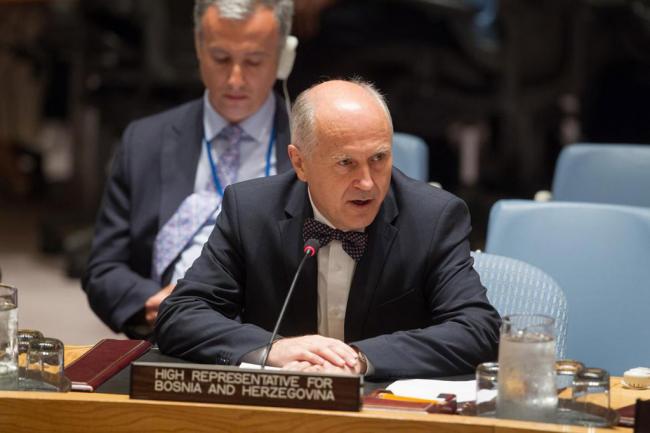13 May 2015, 03:15 pm Print

“Peace is of course a priceless commodity. It should never be taken for granted. But it is the base, not the end state,” the High Representative for Bosnia and Herzegovina, Valentin Inzko, told the Council during the 15-member body's regular meeting on the situation in the country.
It is “entirely right” that after 20 years, the people of Bosnia and Herzegovina – especially the young – expect “so much more” from their country and their politicians. “From the highest young unemployment rate in Europe and many of them are leaving the country,” Inzko added.
In July, Bosnia and Herzegovina will mark the 20th year anniversary of the Srebrenica genocide and in November, the Dayton/Paris peace Accords that ushered in peace to the region.
“So what needs to happen in the next six months is to mark the 20th with a sense of renewed optimism about the future?” he asked.
He answered, “The answer is very simple. We need to see the newly elected authorities in Bosnia and Herzegovina come together to deliver steps to take advantage of European Union (EU) initiative for Bosnia and Herzegovina.”
“Bosnia and Herzegovina has been given a fresh chance and it must be taken,” said the High Representative, emphasizing that the EU initiative offers the country a chance to end years of stagnation.
The good news is that the Government is showing signs that they are ready to implement the written agreement that was adopted in March and has opened the way for the Stabilization and Association Agreement with the EU to enter into force.
However, he said that progress will require concrete results, some of which will be very difficult to deliver. This includes creating new jobs, improving functionality of institutions and the rule of law when it comes to fighting crime and corruption.
“I believe that a great deal can be achieved in 2015 if there is renewed commitment within the country and among its political leaders to pull together and work together, to work as one,” the High Representative said.
“The alternative is to continue doing what we have seen over and over again: to continue politics from the past that has [driven] the country ever deeper into the crisis at the expense of all its citizens, especially the young,” Inzko added.
There are politicians, however, who may be tempted to follow the “negative and dangerous path,” he said, pointing to recent developments that have directly challenged the Peace Agreement.
“As I have made clear repeatedly, the Peace Agreement does not grant the Entities the right to secede, and any attempt to change the Peace Agreement requires the agreement of all parties,” he said.
“The drawing of borders in Bosnia and Herzegovina is behind us. Division and secession are failed strategies that were defeated twenty years ago. Their place is in history books,” the High Representative declared.
Apart form the parties within the country, Inzko said the international community is “duty bound to recognize the importance of this moment,” and do all it could to help the forces of positive change in Bosnia and Herzegovina reach their “surge capacity.”
Photo: UN Photo/Loey Felipe
- BJP wins a seat in Bangladesh — But not the one you think!
- Meet Shabana Mahmood: Could she take over as UK’s first Pakistani-origin Muslim PM?
- Dalai Lama's Office breaks silence on Epstein claims
- Russia says suspect in shooting of GRU Deputy detained in Dubai
- Mystery gunman strikes: Top Russian General shot in dramatic Moscow incident





-1763561110.jpg)
